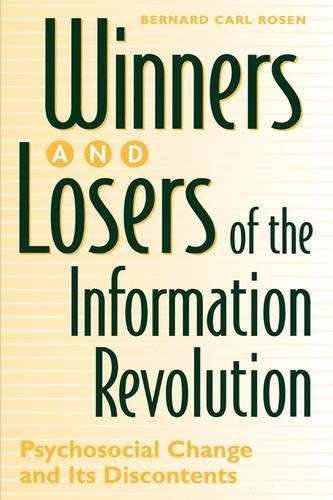
Winners and Losers of the Information Revolution: Psychosocial Change and Its Discontents
(Hardback)
Publishing Details
Winners and Losers of the Information Revolution: Psychosocial Change and Its Discontents
By (Author) Bernard Rosen
Bloomsbury Publishing PLC
Praeger Publishers Inc
24th November 1998
United States
Classifications
Tertiary Education
Non Fiction
Sociology and anthropology
Media, entertainment, information and communication industries
Manufacturing industries
303.4833
Physical Properties
Hardback
336
Description
The second great transformation of our society in the modern era has demoted manufacturing to a position that is secondary to the service industries, thus originating today's information society. This volume examines how massive social change over the past few decades has created a new set of winners and losers and what this has done to society. The author rejects the orthodox explanations for the losers' plightsuch as job stagnation, income inequality, and an increase in crime and violenceand argues that the main causes of success or failure in today's society are psychosocial. While today's losers lack the character structure and values that would help them adjust to change, the winnersthe Chameleonshave acquired a character structure symmetrical with the needs of the new society. This new elite, however, is not immune to anxiety and fear because of the contradictions and impossible demands that characterize what Rosen calls the Chameleon Complex and because different factions of the elite constantly fight to control culture and shape the nation's identity. Rosen puts contemporary social change in an historical context, showing that today's turmoil resembles the disturbances that have taken place whenever society has undergone rapid and fundamental social change.
Reviews
Why do so many Americans feel insignificant and insecure Rosen argues that it is because of the emergence of a technoservice economy characterized as the information society....Rosen advances the thesis that each great transformation does not benefit everyone....This highly readable book sheds light on the consequences of the explosive technological and psychosocial changes of the last three decades of the 20th century. All levels.-Choice
"Why do so many Americans feel insignificant and insecure Rosen argues that it is because of the emergence of a technoservice economy characterized as the information society....Rosen advances the thesis that each great transformation does not benefit everyone....This highly readable book sheds light on the consequences of the explosive technological and psychosocial changes of the last three decades of the 20th century. All levels."-Choice
Author Bio
BERNARD CARL ROSEN is Emeritus Professor of Sociology at Cornell University. He has been the director of research projects on the causes and effects of social change in five countries and three continents. He is the author of four books, including The Industrial Connection (1982) and Women, Work and Achievement (1989), and of numerous journal articles.
